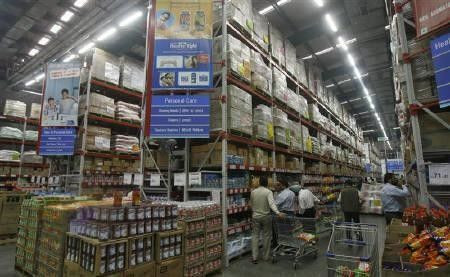Don’t Fool People with FDI in Retail: Advani

The government is fooling the country about the benefits of foreign supermarkets, BJP leader L K Advani said, bolstering resistance to the reform agenda of beleaguered Prime Minister Manmohan Singh.
A decision to allow global giants such as Wal-Mart (WMT.N) into India's $450 billion retail market, the first major economic reform since Singh's graft-riddled term began in 2009, has been met with fierce opposition from parties who say it will destroy the livelihoods of millions of small traders.
Wal-Mart may be fine for (the West) but Wal-Mart does not serve us, Advani, a 78-year-old leader of the Bharatiya Janata Party, said Saturday.
We should not be envious of Wal-Mart, Advani, a former president of the BJP and leader of the opposition from 2004 to 2009, told a summit in New Delhi, warning against a desire to be envious of western economies.
The BJP's opposition to the policy stands in stark contrast to its free-market stance and is the latest move by an increasingly populist opposition that has sought to portray the ruling Congress party as out of touch with common Indians as elections loom in 2014.
Allowing foreign direct investment into the retail industry is one of a basket of reforms seen as key to sustaining India's continued growth that have been postponed over the past 18 months as the government reeled from scandal to scandal.
The controversy has drawn on some deep-seated nationalism in the right-wing opposition party, which appeared to support the policy in 2004 but has now jumped to the support of millions of small shopkeepers that they see as a key vote base.
The BJP has led protests in parliament that have paralysed both chambers every day since the 21-day winter session opened last week.
FOOLING PEOPLE
To give an impression that FDI in retail will solve all problems like inflation, price rise, unemployment... whosoever is saying this is fooling people that FDI will get millions of jobs. It cannot happen, Advani said.
I see no reason why the government decided on FDI in retail knowing full that a large section of people will get affected, added the veteran politician, whom some have tipped as a potential prime ministerial candidate in 2014.
Singh this week rejected calls to roll back the policy amid media reports that some of his coalition partners were thinking of adding their voice to the opposition.
With a thin parliamentary majority, the government is dependent on allies but does not face any immediate threat of losing power.
Singh is unlikely to agree to rescind the policy given that it could damage India's image with foreign investors as Asia's third-largest economy shows signs of slowing.
Local retailers have been content thinking small and doing little. It's time to change that mindset by opening up to FDI in retail, wrote the Economic Times in an editorial on Saturday.
The reform would allow global chains like Wal-Mart, Tesco Plc (TSCO.L) and Carrefour (CARR.PA) to own up to 51 percent of retail ventures and allow foreign firms to fully own single-brand retail operations.
Congress ministers have strongly defended the decision, saying that it will create millions of jobs, improve creaking supply-chain infrastructure and bring down stubbornly high inflation which is crimping economic growth.
The controversy comes as the party fights to fend off accusations of corruption and a failure to tackle high prices before state elections due next year.
© Copyright Thomson Reuters 2024. All rights reserved.




















